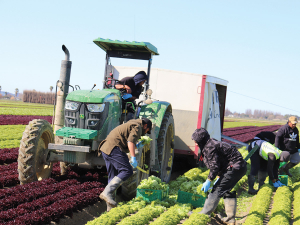NZ avocado growers report mixed season amid weather challenges
Avocado growers are reporting a successful season, but some are struggling to keep their operations afloat following years of bad weather.
 In the US, dieticians are working with health professionals on produce prescriptions to combat certain health issues – like eating more fruits and vegetables to reduce blood sugar levels in diabetics.
In the US, dieticians are working with health professionals on produce prescriptions to combat certain health issues – like eating more fruits and vegetables to reduce blood sugar levels in diabetics.
Imagine a world where your diagnosis is treated by what's on your plate, not by what's in a pill.
The efficacy of 'produce prescriptions' was put before 1,100 delegates at last week's World Avocado Congress in Auckland by keynote speaker Cathy Burns.
Burns, chief executive of US-based International Fresh Produce Association, told the delegates that there was a clear and significant role for food interventions in the healthcare system.
"The time to act is now because if we don't change the trajectory of how this next generation eats, they will be the first generation that doesn't live as long as its parents."
Burns sees a huge opportunity for fruit and vegetable growers in this.
She told delegates that just one in 10 American individuals eat their daily requirements of fruits and vegetables: of the required 400g per day on average they only consume 267g.
"What's interesting is that 75% of consumers agree that fruits and vegetable are required daily in their diets and that they think that they eat the right amount."
Burns says this must change.
"We are better than 1 in 10 and better than just 267g a day."
She believes the silver lining from the pandemic is that "the world now understands the association between what we put in our bodies and how we feel".
Burns added that in the US, dieticians are working with health professionals on produce prescriptions to combat certain health issues - like eating more fruits and vegetables to reduce blood sugar levels in diabetics.
"You go to a doctor, and you have an ailment, and they prescribe a prescription of fruit and vegetable," she explained. "You take that voucher to a supermarket or grocery store and get it filled on a monthly basis with zero to no cost to the patient."
She believes that produce prescriptions are a practical and scalable solution that are already demonstrating positive outcomes through federally-funded pilot programs in the US.
"You go to the doctor, you get a diagnosis, and they give you a prescription for fruits and vegetables to treat your condition," Burns added. "Imagine a world where your diagnosis is being treated by what's on your plate, not by what's in a pill.
"This could be transformational for the trajectory of human health around the world."
What A Waste!
The World Avocado Congress, held in Auckland last week, heard how $600 billion worth of food is lost just before or after harvest.
International Fresh Produce Association chief executive Cathy Burns says two thirds of those losses are edible fruits and vegetables.
Burns says supermarkets waste around $400b of food annually - about 7% of their total sales.
She says different organisations are doing different things to combat this.
In the UK, some retailers are eliminating the 'best before' date on packaging.
"They are letting consumers decide whether the food is good to eat," Burns says.
Keratin biomaterials company Keraplast and Wools of New Zealand have signed a new superpremium wool contract which is said to deliver a boost to wool growers.
While things are looking positive for the red meat sector in 2026, volatility in global trade remains a concern, says the Meat Industry Association (MIA).
The quest to find innovative practical, scientific solutions to deal with water-related issues at a catchment level has been the theme of an important conference at Massey University last week.
One of the country's top Māori farms faces a long and costly rebuild to get the property back to where it was before recent storms ripped through it.
The latest Global Dairy Trade auction results have delivered a boost to dairy farmers.
New Zealand potato growers are prioritising value creation from high yields to meet a complex mix of challenges and opportunities, says Potatoes NZ chief executive Kate Trufitt.

OPINION: First on the scene after the recent devastating storms in parts of the North Island were emergency services and selfless…
OPINION: Why can't Christopher Luxon stand up to Winston Peters over the latter’s high-profile attack on the proposed Indian FTA?